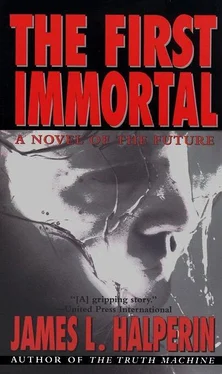“Could we set up a trust?”
“Sure. Trust laws are different in every state, so I imagine I can find a viable venue somewhere. I’ll have to do some research. Maybe Wisconsin. Come to think of it, South Dakota might be just as tolerant of trusts in perpetuity, and they have no state income tax.” He shrugged. “Ben, it’s your money. You can do whatever you want with it. Anything that will stand up to legal challenge, that is.”
“I know. I guess I’m a little uncomfortable with the whole idea.” Ben thought about the oxygen mask on the airplane, at first inspired by the analogy. Then he faltered in his resolve. Maybe he wasn’t really seeing to his survival because his family might need him later. What if he was hogging all the oxygen out of greed and fear? “This is pretty selfish of me, isn’t it?” he asked, hoping for approbation.
Webster provided it as if on cue. “Pretty selfish?” the lawyer chortled. “Most people would take it all with them if they could. You’re providing for your family now, and offering them hope of resurrection. If that’s selfish, I think I need a new dictionary.” Then he shook his head as if to clear the contradiction. “But if it works, aren’t you worried about what the world’ll be like by the time scientists know how to revive you?”
Ben had already considered that at length. “Not really. If it’s the sort of world that’s willing to revive people, and if they possess a science so advanced as to be able to restore a person from death as we now define it, their action will have to be its own reward. It’s not as though they’d need humans for slave labor or menial tasks. Machines would be able to do almost anything humans could, for a lot less money. And they certainly won’t need my knowledge of twentieth century medicine. This world of the future would function on digitized information and robotics; just as we depend on electric lighting and internal combustion engines. No. If they’re thawing people and curing their diseases, they’ll be doing so simply because they love doing it; because they value human life for its own sake.”
“That makes sense,” Webster said thoughtfully. And for the first time in their conversation, Ben was convinced of the lawyer’s sincerity. At least on that point, he knew he’d convinced Webster of his logic.
“Also,” Ben continued, “I think human existence tends to improve. Not in a straight line, but gradual progress in fits and starts. It doesn’t always seem that way, especially if you read newspapers or watch the news on TV. But that’s only because good news isn’t as interesting. Sure, we have crime, the environment, nuclear bombs, and the population explosion to worry about. Still, by most reasonable measures, society’s becoming more open, healthier, and more democratic throughout the world. On average.”
“You really believe this is gonna work, don’t you?” Webster’s voice seemed to carry a note of hope.
“Probably not.”
“Oh.” Webster tugged at an ear; his eyes narrowed. “Then why bother with it?”
“My father used to tell a story about a devout man whose wife’s injured in a car wreck. She has to have an operation they can’t afford or she’ll never walk again. So he prays, night and day: ‘God, please let me win the lottery.’ Finally, after some months he starts to lose faith. He berates God, and screams, ‘I have been a pious man my entire life, have always tried to please you, and have never asked for anything before. Now the one time I really need help, you turn your back on me. When in the hell will you answer my prayers?’ Suddenly the skies turn black, thunder roars, and lightning flashes. A deep voice resounds from the sky, shaking the ground like an earthquake. And God asks, ‘When in the hell will you buy a lottery ticket?’”
October 19, 1985
A lazy Saturday morning, seven A.M., and Ben reveled in the luxury of a leisurely read. Boston Globe spread across floor, couch, and lap, he scanned the financial section, his third choice after world news and the sports page.
—Ford Taurus Firmly Established as America’s Best Selling Automobile—
Big surprise.
—Reagan to Sign Gramm-Rudman Act—
Yawn.
—Yamatsuo International Launches Cellular Phone—
Whoa… Ben read on, his interest intense, though hardly in the subject matter at hand. Without thinking, he’d lifted the phone, punched zero, been told he could direct-dial, lied by telling the operator that he was sight-impaired, then had his call quickly but courteously put through to Japan. His emotions were charged and all-embracing, leaving no room for guilt.
“…and it is nine P.M. here, sir,” a secretary at Yamatsuo International headquarters was saying in unaccented but too precise English.
“Oh… Stupid of me. An impulsive call. Don’t know what made me do it.”
“I will make sure Mr. Yamatsuo receives your number, sir.”
Now feeling like a total idiot, Ben hung up and reached for the comics. They somehow seemed an appropriate read.
He was laughing at Garfield when his phone rang.
“Smee-tee-san?”
The intelligent but indolent orange cat, and the rest of Ben’s world, disappeared.
They talked for ten minutes about nothing and everything; ten became twenty; twenty became an hour. It wasn’t until ten-fifteen that Ben regained any sense of time. “Good Lord,” he said. “How late is it there?”
“Bit after midnight,” Hiro Yamatsuo replied in nearly perfect English, which he had strangely yet graciously developed as the conversation ran along.
Ben marveled at his old enemy. “Sorry I’ve kept you so long,” he apologized.
“There isn’t much to do in a Tokyo hospital room, Smitty. Believe me, this is a welcome diversion.”
“Hospital room?”
“Nothing serious. Cataract surgery. Though I’m told an error with the anesthesia nearly killed me. Apparently I’ve had a rare allergic reaction that had been improperly tested for.”
“Nearly lost a patient myself that way, years ago. A close call…”
Yamatsuo laughed. “You can’t live forever…”
These words rocketed Ben forty years backward in time. “ I’ve never said that!” He couldn’t feel his own body. What came next out of his mouth shocked even Ben himself. “You ever considered cryonics, Hiro-san?”
Amazingly, Hiro Yamatsuo not only listened to his spiel but encouraged him. An hour later Ben thought he just might understand how an evangelist—having just delivered a longwinded but impassioned sermon—might feel.
“You’ve convinced me to investigate the matter.” Yamatsuo then issued a strangely wistful sigh, like a man who’d lost something never to be regained. “You talked to me as an old friend. I had forgotten how that feels. Ironic that I should momentarily recapture such childhood feelings with you.”
Ben chuckled nervously. He had no idea what to say. Ironic that I should give a damn came into his mind but did not emerge from his mouth.
Yamatsuo seemed to sense Ben’s unease. Too cheerily, he added, “Yes, I’ll investigate this cryonics concept just as soon as my schedule permits.”
“You shouldn’t wait,” Ben said. “If you’re interested, just do it. Like your recent brush, almost no one can anticipate their dying day with accuracy. Besides, what’s there to lose? The money can’t be an issue to a man like you.”
“No, but as with everything, it is a matter of finding the time.”
“It’s more than that,” Ben heard himself say. “It’s a matter of all time, and that’s easy to forget.” Like so many others, he believed, this older man would entertain the idea lavishly, then show it the door. “If you’re really interested, invest the time and effort, and do something about it.”
Читать дальше












